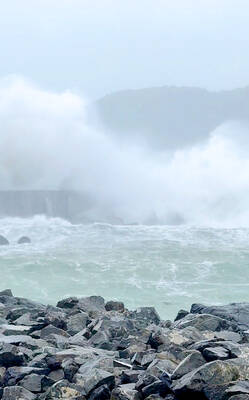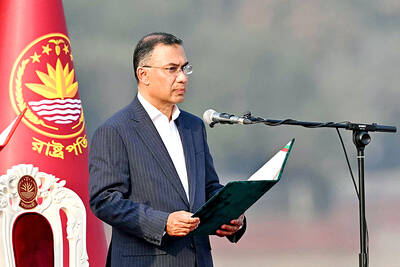Sony Pictures still wants and intends to release its controversial film The Interview, possibly via YouTube.
As US President Barack Obama again expressed disappointment in the company’s decision to withdraw the movie in the face of threats thought to originate from North Korea, Michael Lynton, the studio’s chief executive, said on Sunday it had “not caved” in to hackers who crippled the company and that it was exploring ways to let audiences see the film.
“We would still like the public to see this movie, absolutely,” Lynton told CNN.
“There are a number of options open to us and we have considered those, and are considering them,” he said.
Asked about releasing the film via YouTube, he said: “That’s certainly an option and certainly one thing we will consider.”
Lynton’s comments revived the prospect of audiences legally viewing the comedy which stars James Franco and Seth Rogan as journalists who assassinate North Korean leader Kim Jong-un.
The US government has blamed North Korea for the cyberattack which paralyzed the Hollywood studio’s computer networks and splashed its digital archives across the Internet.
Pyongyang denied any involvement.
Anonymous terrorist threats last week, to target screenings, prompted cinema chains and other distributors to refuse to show The Interview. The studio then canceled the film’s planned theatrical release on Thursday and said it had “no plans” for a release in any form.
Obama and many others accused the studio of surrendering to intimidation and setting a precedent for censorship.
Lynton struck back on Sunday, saying Sony still wanted to release the film.
“We have always had every desire to have the American public see this movie,” he said.
He said cinema chains’ refusal to carry the film forced the theatrical cancelation.
“At that point in time we had no alternative but to not proceed with the theatrical release on 25 December and that’s all we did. We did not cave, we have not given in and we have not backed down,” Lynton said.
Sony Pictures’ original statement last week appeared to rule out any attempt to release The Interview, but Lynton, in an attempt to regain the moral high ground, said it was in fact considering digital and video-on-demand options, despite a lack of support from distributors.
“There has not been one major video-on-demand distributor, one major e-commerce site that has stepped forward and said it is willing to distribute this movie for us,” he said. “We don’t have that direct interface with the American public and need an intermediary to do to that.”
Netflix, Amazon, TimeWarner and other big distributors made no immediate comment, nor did Google, which owns YouTube.
Director of the movie Judd Apatow last week predicted that the movie would be available on BitTorrent within six weeks.
The company claims to have more than 170 million monthly active users.

Heavy rain and strong winds yesterday disrupted flights, trains and ferries, forcing the closure of roads across large parts of New Zealand’s North Island, while snapping power links to tens of thousands. Domestic media reported a few flights had resumed operating by afternoon from the airport in Wellington, the capital, although cancelations were still widespread after airport authorities said most morning flights were disrupted. Air New Zealand said it hoped to resume services when conditions ease later yesterday, after it paused operations at Wellington, Napier and Palmerston North airports. Online images showed flooded semi-rural neighborhoods, inundated homes, trees fallen on vehicles and collapsed

‘COST OF DEFECTION’: Duterte’s announcement could be an effort to keep allies in line with the promise of a return to power amid political uncertainty, an analyst said Philippine Vice President Sara Duterte yesterday announced she would run for president of the Southeast Asian nation of 116 million in 2028. Duterte, who is embroiled in a bitter feud with Philippine President Ferdinand Marcos Jr, was impeached last year only to see the country’s Supreme Court throw the case out over procedural issues. Her announcement comes just days before her father, former Philippine president Rodrigo Duterte, begins a pretrial hearing at the International Criminal Court (ICC) in the Netherlands over crimes against humanity allegedly committed as part of a brutal crackdown on drugs. “I offer my life, my strength and my future

POST-UPRISING: Bangladesh Nationalist Party lawmakers were yesterday expected to formally elect Tarique Rahman as their leader and new head of government Bangladesh’s prime minister-to-be Tarique Rahman and lawmakers were yesterday sworn into parliament, becoming the first elected representatives since a deadly 2024 uprising. Rahman is set to take over from an interim government that has steered the country of 170 million people for 18 months since the autocratic government of Sheikh Hasina was overthrown. The lawmakers, who promised loyalty to Bangladesh, were sworn in by Chief Election Commissioner AMM Nasir Uddin. Bangladesh Nationalist Party (BNP) lawmakers are expected to formally elect Rahman as their leader, with President Mohammed Shahabuddin then to administer the oath of office to the prime minister and his ministers

NOT YET THERE: While the show was impressive, it failed to demonstrate their ability to move in unstructured environments, such as a factory floor, an expert said Dancing humanoid robots on Monday took center stage during the annual China Media Group’s Spring Festival Gala, China’s most-watched official television broadcast. They lunged and backflipped (landing on their knees), they spun around and jumped. Not one fell over. The display was impressive, but if robots can now dance and perform martial arts, what else can they do? Experts have mixed opinions, with some saying the robots had limitations and that the display should be viewed through a lens of state propaganda. Developed by several Chinese robotics firms, the robots performed a range of intricate stunts, including martial arts, comedy sketches and choreographed